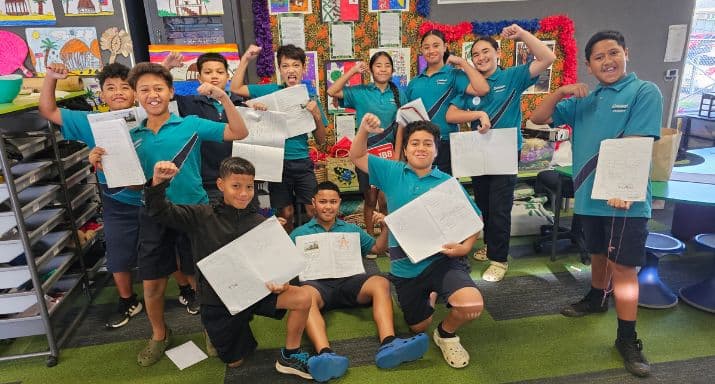Interview: Meet Aotearoa's Reading Warrior
David Riley is the writer and teacher behind the Reading Warrior books and student writing workshops. His books focus on Aotearoa and Pacific leaders, heroes, legends and sportspeople. In his workshop programmes he visits schools around the country, working with students of all ages, particularly in schools with Māori and Pasifika communities, to find their voice and write their own stories.
Kia ora David, tell us a little about your work, and Reading Warrior’s kaupapa.

I’m a writer and teacher based in South Auckland. My goal is to get young people reading again, to inspire them with positive, inspirational stories from New Zealand and the Pacific, and to encourage them to write and publish their own stories.
What are you working on right now?
I've just finished work on a book called Black Magic which tells the story of why our Kiwi sports teams wear black with a silver fern emblem. It's a truly inspiring story and one that isn't very well-known, but which should be. Understanding the origins of the colour and fern, and their deeper meanings, especially in te ao Māori, gives us a stronger appreciation for our national colours and their symbolism. This book was illustrated by Munro Te Whata and it has been a blessing to work with Munro again. He illustrated my very first book We Are the Rock/Niue Heroes.
An important aspect of your work is helping children to tell their own stories. How do you work with students?
I’ve just started a new series, Oceania Heritage, about places in the Oceania region, written and illustrated by children from those places. Editor Carolyn Lagahetau has been working on the first book of this series with me, which celebrates Niue's 50th year of independence, happening in October this year. Oceania Heritage: Niue features writing and illustrations by Niue children in Niue, in New Zealand, and around the world, including in places like Norway, Japan and Wales! The children selected topics they wanted to write about and these range from Niue history, to traditions, to life as a young person today. It’s set to be launched in Niue during the Constitution week celebrations.
Can we talk about what the illustrators with whom you work bring to Reading Warrior books?
On another current project, I’m working with illustrator Adele Jackson on an illustrated biography of Albert Baskerville, an extraordinary young man who lived in the early 19th century and is responsible for rugby league’s establishment in New Zealand. Adele is one of those talented illustrators who can work in multiple different styles and I love seeing the roughs she sends through and the way she brings Albert and his achievements to life visually. I love working with our community of children's writers and illustrators, because we’re all so supportive of each other. Adele also introduced me to Sarah Wilkins who is illustrating another exciting new project. I’ve been talking to the family of Kiwi-Cook Islands poet Alistair Te Ariki Campbell about getting one of his pieces, Poem for Ataahua, illustrated for kids and recently they granted me permission to do that. It’s such an awesome poem. I particularly like the poem’s lyrical nature and the way it celebrates Aotearoa wildlife such as the wētā. My drama students at Tangaroa College set one stanza of the poem to music and we included it in a show about Alistair Campbell that we created. Since then, I've wanted to create a book version of it as well. I think Sarah’s artwork will help children to discover it and find meaning in it for themselves.
And to finish, can we talk about why it’s so important to encourage children to write their own stories? Are there other initiatives that are doing important work in this space too?
I’m excited about Read NZ Te Pou Muramura's project Pōkai Tuhi. It enables Māori and Pasifika writers to go into schools and hold workshops with children and that's awesome, because when our Māori and Pasifika young people can see writers from their own backgrounds, and engage in writing workshops with them, it encourages them to know they can do it too if they want to, so we can grow even more writers.
Pictured: students at a workshop at Dawson Road School, courtesy of Reading Warrior.